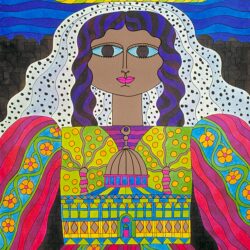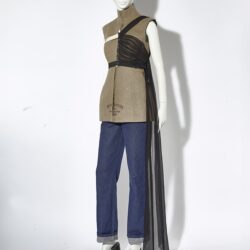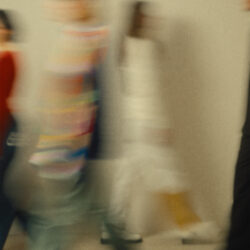Sustainability Day: Towards Sustainable Museum Operations

MoMu Collection
MoMu also endeavours to work toward better sustainability in the depot, where the museum's collection is stored. By investing in (more expensive) sturdier packaging materials, which last longer, MoMu strives to reduce its ecological footprint. The choice was therefore made to reduce overuse of silk paper as a packaging material, which has to be replaced every year due to acidification, by working with more sustainable materials such as unbleached cotton and padded tricot rolls. Acid-free boxes with a short lifespan are also being replaced by drawers and shelving, which will last a lifetime.
In addition, recycling means that the mannequins are more sustainable. For example, jumpsuits and bumps and lumps have been custom-made for the mannequins, which can be reused for each exhibition. Moreover, every part of the mannequinage is recycled, by removing the support elements after an exhibition which can be used to store other objects. MoMu also recently purchased new mannequins, which can be used for any type of silhouette and can therefore be reused again and again at any exhibition.
MoMu Exhibitions
MoMu also strives to generate a limited ecological footprint within its exhibitions. In developing the scenographic design for an exhibition, 'reuse and sustainability' is an important evaluation criterion. In addition, each temporary exhibit is examined to see which materials can be reused. MoMu refuses to make exhibitions that do not contribute to the question of how we can be more sustainable.
A unique display case was already built several years ago in the temporary exhibition space on the ground floor, which can be reused for each new exhibition. The display case is designed so that it can be converted in various ways with the least amount of intervention.
MoMu Public
MoMu raises awareness about sustainability through its public programme. Specifically, the public outreach service focuses on raising awareness about sustainable fashion in a variety of ways. For example, they developed a Fashion & Sustainability Walk - a city walk across the Antwerp fashion scene on the many facets of sustainability. This tour can be booked by schools and groups, and is also organised once a month for individual visitors. MoMu planned this tour in 2023 for the programme of an event of the European Union, which organised a campaign on textiles and sustainability, and for which MoMu is one of the partners.
In 2023, the public outreach service transformed this tour into an interactive presentation for secondary schools. In addition, the public outreach service also developed a Propere Kleren (Clean Clothes) teaching folder for secondary schools.
Sustainability is also a theme in all planned workshops. The proposed workshops cover the themes of upcycling, reusing and recycling old clothing. Recycled materials are also used as the basis for the actual implementation of these workshops.
MoMu Library
Since the reopening of the museum in 2021, the study collection has been part of the operations of the MoMu library. This study collection offers various opportunities to reach out to a wide range of target groups. Close cooperation between the public outreach service and the library therefore goes without saying. This is also the case for the Fashion & Sustainability Talk. At the end of this interactive presentation, each (school) group gets a sneak peek into the study collection of the MoMu library, where they can view archival images from the presentation live. The interactive workshop Identi(time) also focuses on recycling clothing and sustainability in clothing history.
What's more, the library works hard to raise awareness among visitors about sustainability and the importance of recycling. For example, a section on sustainability and recycling within fashion and textiles was set up in the reading room, and scrap paper is reused as note pads for visitors to the reading room.
MoMu also endeavours to preserve its museum collection intelligently and sustainably. Sustainable storage also means researching and implementing more sustainable ways of storing and packaging materials. MoMu preserves its library collection as sustainably as possible: much of the collection has been packaged in boxes, folders and covers that last a lot longer.
MoMu Staff
Sustainability starts with us. MoMu makes museum staff aware of the role they have to play and the difference they can make. We make them aware by consistently applying the 6 R's as an assessment framework for sustainability: refuse (choose not to purchase non-ecologically responsible products), reduce (try to avoid waste), reuse (materials), repurpose (give something old a new life), recycle (sort waste) and raise awareness (create awareness among a broad target group).
MoMu staff take these concerns to heart and try to make a big difference with small actions. A drinking water system is available in the staff kitchens that offers filtered chilled and sparkling water, whereby refillable drinking bottles and water jugs can be reused during meetings. In the spring of 2024, MoMu added a sharing shelf in the shared refrigerator for staff. Food that can no longer be consumed by the best before date can be put on this shelf for a colleague to eat. In this way, MoMu is trying to keep leftover food to an absolute minimum, while reducing unnecessary waste in the process.
Digital data also consumes a lot of energy. MoMu organises an annual digital clean-up of its files, to reduce both quantity and size.
MoMu Café
The MoMu Café strives to keep its ecological footprint as limited as possible and has consciously opted for plant-based products. Various studies have shown that the average vegan diet reduces greenhouse emissions by up to 60%. A comparison between a plant-based diet and a diet with an average amount of meat (50 to 99 grams per day) shows that a plant-based diet more or less halves emissions.
All of the Café's takeaway packaging is compostable, the plant-based milk is only purchased in bulk quantities (by pallet) to reduce transport, and 80% of the ingredients are organic and purchased directly from local farmers. Given that everything is made fresh and in small production volumes, the MoMu Café produces little to no waste. What's more, the MoMu Café offers a specialty coffee, which guarantees organically-grown beans, fair prices and decent working conditions.

MoMu Infrastructure
Textiles and plastics are highly sensitive to temperature and humidity. MoMu therefore monitors whether the climate in the museum is suitable, deviating somewhat from the imposed standards. Indeed, the decision was taken to work according to bizot standards, which allow seasonal temperature variations. As a result, it is warmer in summer and colder in winter, reducing the need for cooling or heating.
In addition, MoMu uses green energy in its external storage facility, which is supplied by the landlord Katoennatie, and we continue to look for possible 'green investments' throughout the premises. After the museum's most recent renovations, for example, several necessary changes were already made to make the building healthier and greener. Rainwater is now collected, there is better insulation and LED lighting.
There is also a drinking water system with filtered chilled and sparkling water for visitors at -1, near the lockers and toilets. Visitors can fill their reusable water bottle here, or use a reusable cup for refreshments.

















